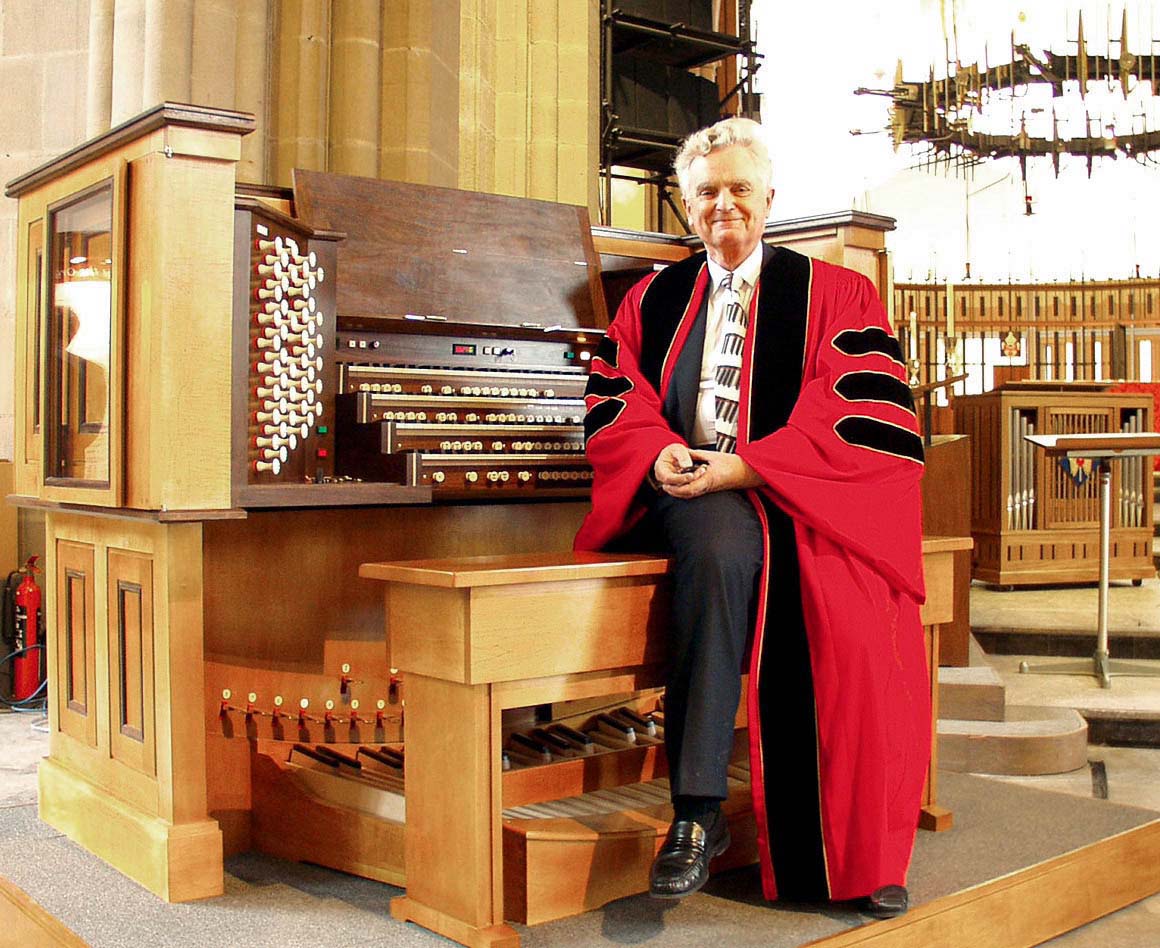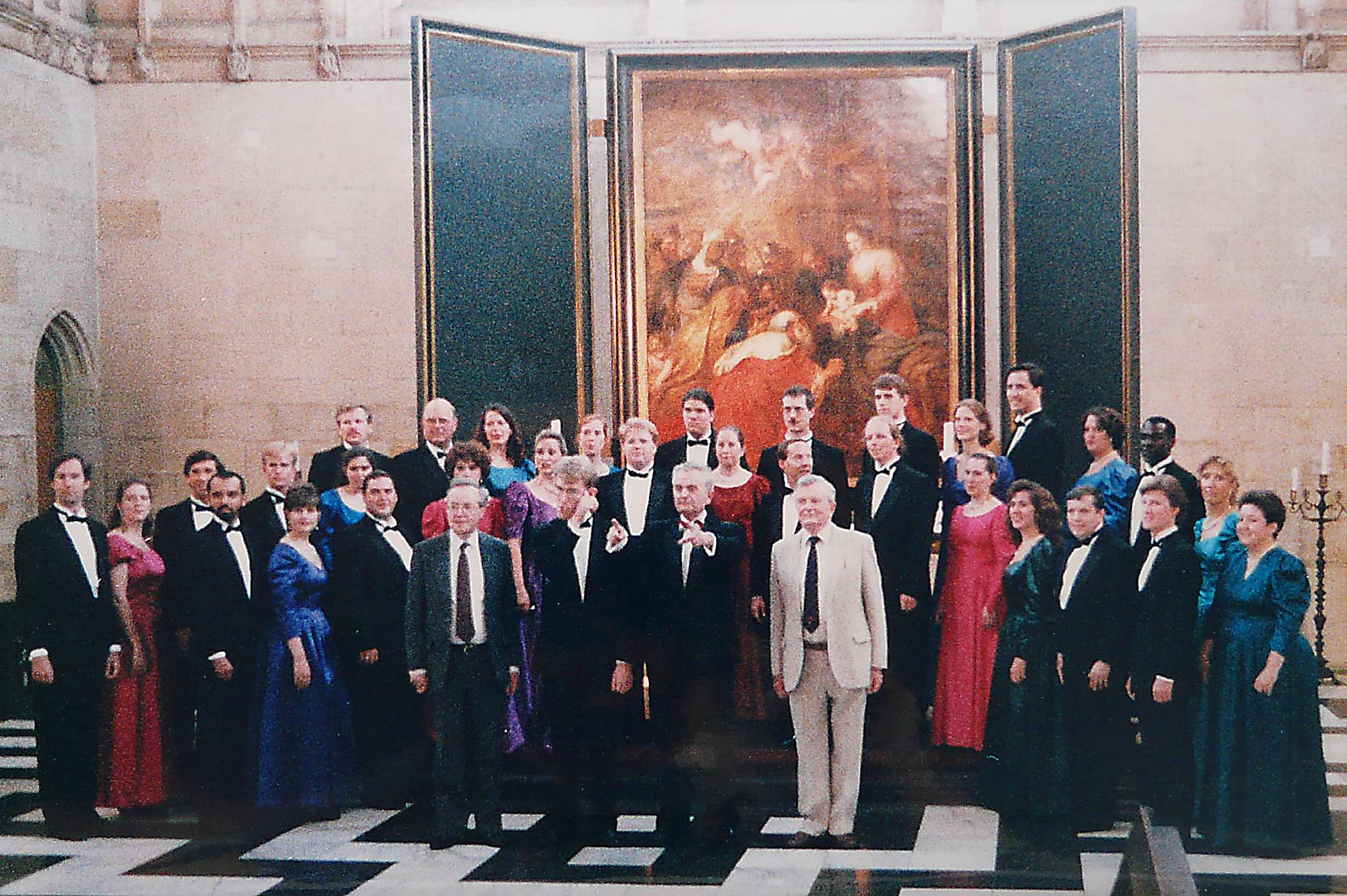How to transform your choir
and fill your stalls
with enthusiastic singers
10. Punctuality

by Dr John Bertalot
Organist Emeritus, St. Matthew's Church, Northampton
Cathedral Organist Emeritus, Blackburn Cathedral
Director of Music Emeritus, Trinity Episcopal Church, Princeton, NJ, USA
PUNCTUALITY & ATTENTION
50% of choirmasters have problems with getting their singers to arrive at rehearsals punctually and, once they’ve arrived, 60% of choirmasters have problems in getting their singers to listen to the musical instructions they’re given.
These two problems can be solved fairly easily – if you really want to try.
PUNCTUALITY
If you, the choirmaster, have a reputation for punctuality – not only starting and ending your rehearsals on time, but also arriving at meetings and social occasions punctually – you should have no trouble instilling your own sense of punctuality into your singers.
But if they know that you are unpunctual yourself no amount of pleading will do any good. Our choirs are a true reflection of ourselves. Your choir will become what you already are.
There are a few practical things you can do to encourage punctuality:

1. Buy a large clock which has a second hand and place it in a prominent position in your choir room. Two minutes before the practice is due to start say with a smile, ‘Two minutes to go!’. And then you might do a count-down for the last ten seconds, ‘ … 3, 2, 1 – Good evening!’
2. Make sure that you finish your rehearsal punctually. If it is due to end at 9.00 pm you should finish within a few seconds of that time. But if your rehearsal seems likely to over-run, announce ten minutes beforehand, ‘We may over-run a little tonight. I apologise.’
3. Get to your practice room 30 minutes early to ensure that everything is in order so that you may welcome your singers when they arrive. Once you show that you are interested them as people rather than ‘singing units’ they will respond to your one-on-one approach.
I’ve done this increasingly throughout my professional life and also now that I’m retired; I know that it works. I had a village church choir – they were always punctual. Some singers even arrive 30 minutes early for our rehearsals and the rest are there fully 10 minutes before we start – for we enjoyed talking to each other. A choir is a social group as much as it is a body of musicians.

We did have one singer who tended to arrive a minute or two late. One evening I said to the choir, ‘When he arrives, whatever we’re doing, give him a round of applause to show that we’re pleased to see him!’ He’s never been late again – even though he still tends to arrive two minutes before we begin! But this adds to the choir’s acceptance of the self-discipline of punctuality which is essential if the choir is to become a disciplined body of singers.
That’s the best definition of a choir I’ve ever heard – A disciplined body of singers – not just a body of singers, or worse still, a group of people who sing. John Humphrys, in his book Lost for words, wrote (page 26), ‘Discipline does not limit; it liberates.’ Is your choir a liberated body of disciplined singers?
TALKING
Does your choir really listen to the instructions you give or do you find that you have to repeat them because some singers were talking? If your rehearsals are geared to producing excellent results efficiently, this is a problem that should not arise.

1. If the instructions you give to your singers are worth listening to they will listen. This immediately places the burden of responsibility upon you, their choirmaster. If you what you say is not worth listening to your singers won’t listen.
I recently attended a rehearsal of a small church choir. When their rehearsal began the choirmaster talked for fully four minutes (I timed him) before they sang a note! His instructions to the singers, once they began singing, were virtually useless: ‘Think a little about the expression … that wasn’t very good; sing it better!’
So let your instructions be crisp and immediately practical:
• ‘Sing that first chord again; we didn’t sing it together. One, two, ready, breathe!’ … Most of you started with me, but not everyone. Watch me and do it again!’
• ‘Look at the expression on the top of that page; should you sing those notes loudly or softly? … Let’s try it again. Was that really soft? Try it once more.’
• ‘Tenors, you sang an E there instead of a D. Sing that phrase for me. … now let’s sing it together.’
• ‘Are the words happy or sad? How can you convey the message of the words to the congregation? Yes, by singing them as though you believed them! Say those words for me, and stress the consonants. Now sing them. I still can’t hear the letter D. Try it again.’
2. If you truly believe that what you say to your choir is worth listening to, you will not give your instructions until everyone is listening. If two people are talking wait patiently until they have finished and then give your instruction. The message will quickly come home to everyone that you insist on total attention from everyone – be they adults or children.
When I was guest conductor of an internationally renowned cathedral choir in California I discovered, much to my surprise, that not everyone listened to my first instruction, which was, ‘Sing that first chord to the vowel Ee.’ Half the choir did what I asked but the other half began singing the anthem. Immediate action on my part was called for. So I said, ‘Ladies and gentlemen, we have a lot of work to do tonight and so it would be helpful if I gave my instructions only once.’ They all immediately sat up straight, mentally and physically, and we enjoyed a great practice.
Never repeat an instruction once you have given it firmly and clearly. If someone asks, ‘What did you say?’ ask the singer next to him to tell him. You will be showing him, and everyone else, that you really mean business. (See my book How to be a successful choir director for more immediately practical tips on these problems.)
We human beings love to follow strong leaders who have a clear goal.That’s why your singers have joined your choir – to follow your lead.
Is your lead strong?
Is your lead clear?
Are you worth following?
The responsibility is yours.
© John Bertalot, Blackburn 2013

Obtainable online,
or through Amazon,
or through Kevin Mayhew, Buxhall, Stowmarket, Suffolk IP14 3BW, UK






















